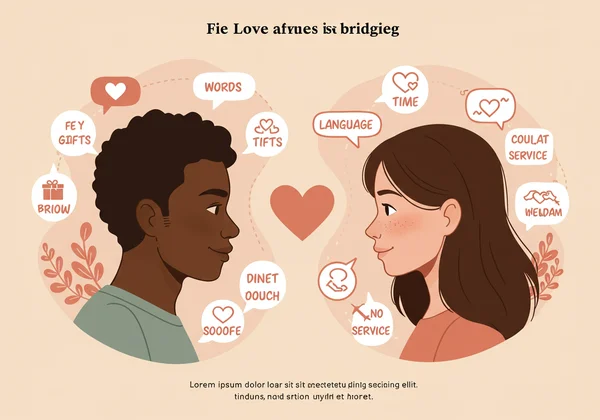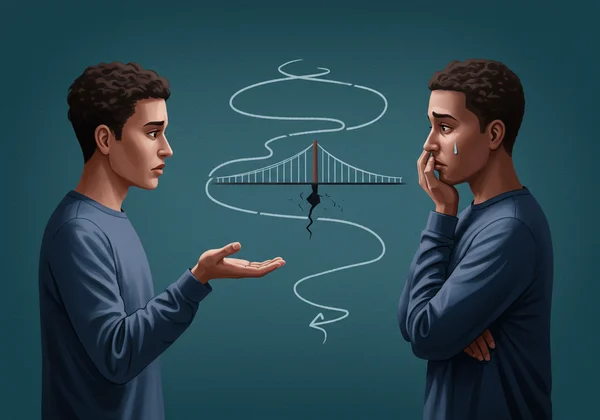Cách Xin Lỗi: Hướng Dẫn Sử Dụng Ngôn Ngữ Tình Yêu Để Xin Lỗi Hiệu Quả
September 7, 2025 | By Hannah Carter
Bạn đã bao giờ nói lời "Tôi xin lỗi" chân thành, nhưng lại nhận được sự lạnh nhạt hoặc câu nói đáng sợ, "Không, bạn không thật lòng"? Đó là một trải nghiệm gây khó chịu và phổ biến trong các mối quan hệ. Sự thật là, một lời xin lỗi sâu sắc không chỉ là lời nói; đó là một hành động giao tiếp cần được đón nhận một cách chân thành như khi nó được đưa ra. Đây là lúc một lời xin lỗi theo ngôn ngữ tình yêu có thể biến xung đột thành kết nối. 5 ngôn ngữ tình yêu là gì, và làm thế nào chúng có thể thay đổi hoàn toàn cách bạn nói lời xin lỗi?
Hiểu cách bạn và những người thân yêu cảm thấy được nhìn nhận, được trân trọng và được thấu hiểu một cách độc đáo là chìa khóa để hàn gắn và sửa chữa mối quan hệ hiệu quả. Nếu lời xin lỗi của bạn không chạm tới trái tim đối phương, có thể là do bạn không nói đúng ngôn ngữ. Bước đầu tiên để khắc phục điều này là khám phá ngôn ngữ tình yêu của bạn thông qua bài kiểm tra nhanh, sâu sắc của chúng tôi. Hướng dẫn này sau đó sẽ chỉ cho bạn cách điều chỉnh lời xin lỗi để xây dựng một kết nối cảm xúc mạnh mẽ hơn.

Tại Sao Lời Xin Lỗi Không Đạt Hiệu Quả: Những Sai Lầm Giao Tiếp Phổ Biến
Chúng ta thường cho rằng chỉ cần có ý định tốt là đủ khi chúng ta xin lỗi. Tuy nhiên, xung đột tạo ra khoảng cách cảm xúc, và một lời xin lỗi chung chung có thể không đủ để thu hẹp khoảng cách đó. Lý do nhiều lời xin lỗi thất bại không phải là thiếu chân thành, mà là sự trục trặc trong giao tiếp. Bạn có thể đang đưa ra một giải pháp khi đối tác của bạn chỉ cần được lắng nghe, hoặc ôm khi họ cần nghe bạn thừa nhận trách nhiệm.
Đây là những sai lầm giao tiếp phổ biến có thể khiến cả hai người cảm thấy bị hiểu lầm và tổn thương. Mục tiêu của một lời xin lỗi không chỉ là chấm dứt một cuộc cãi vã; đó là để chữa lành vết thương tình cảm và tái khẳng định sự tin cậy trong mối quan hệ. Bằng cách học cách nói ngôn ngữ tình yêu của đối tác, bạn có thể đảm bảo lời xin lỗi của mình thực sự có tác dụng và bắt đầu quá trình chữa lành.
Sự Ngắt Kết Nối: Khi Ý Định Của Bạn Không Tương Xứng Với Tác Động Của Họ
Vấn đề cốt lõi là khoảng cách giữa những gì bạn muốn truyền đạt và cách đối tác của bạn cảm nhận nó. Bạn có thể nói, "Tôi xin lỗi," với ý định bày tỏ sự hối tiếc sâu sắc. Nhưng nếu ngôn ngữ tình yêu chính của đối tác bạn là Hành Động Phục Vụ, họ có thể đang nghĩ, "Nói xin lỗi thì dễ, nhưng bạn có định giúp tôi sửa chữa vấn đề bạn đã gây ra không?" Điều này không phải vì họ khó tính; đó là vì hành động quan trọng hơn lời nói đối với họ. Nhận ra sự ngắt kết nối này là bước đầu tiên hướng tới một lời xin lỗi hiệu quả hơn.

Sức Mạnh Của Lời Xin Lỗi Được Điều Chỉnh Trong Hàn Gắn Mối Quan Hệ
Một lời xin lỗi cá nhân hóa, được tạo ra đặc biệt cho ngôn ngữ tình yêu của người nhận, thể hiện một mức độ đồng cảm và thấu hiểu sâu sắc. Nó nói, "Tôi hiểu bạn, tôi thấy nỗi đau của bạn, và tôi đang nỗ lực để thể hiện sự hối tiếc của mình theo cách có ý nghĩa nhất đối với bạn." Cách tiếp cận này vượt xa việc chỉ thừa nhận lỗi lầm; nó tích cực tham gia vào việc hàn gắn các mối quan hệ và xây dựng lại sự tin tưởng. Khi bạn nỗ lực xin lỗi bằng ngôn ngữ của họ, bạn công nhận cảm xúc của họ và cho thấy rằng nhu cầu tình cảm của họ quan trọng đối với bạn, điều này là nền tảng cho một kết nối cảm xúc lành mạnh.
Soạn Thảo Lời Xin Lỗi Của Bạn Cho Từng Trong 5 Ngôn Ngữ Tình Yêu
Vậy, làm thế nào để bạn áp dụng điều này vào thực tế? Chìa khóa là trước tiên hãy xác định ngôn ngữ tình yêu chính của đối phương. Nếu bạn không chắc chắn, việc cùng nhau làm bài kiểm tra 5 ngôn ngữ tình yêu có thể là một hoạt động vô cùng mang lại nhiều hiểu biết. Một khi bạn biết ngôn ngữ của họ, bạn có thể sử dụng các chiến lược sau để tạo ra một lời xin lỗi thực sự chạm đến trái tim họ.

Lời Khẳng Định: Nói "Xin Lỗi" Với Sự Chân Thành và Cụ Thể
Đối với một người có ngôn ngữ là Lời Khẳng Định, những gì bạn nói và cách bạn nói là tối quan trọng. Một lời "xin lỗi" nhanh chóng sẽ không đủ. Họ cần nghe sự hối tiếc, hiểu rằng bạn nhận ra tác động của hành động của mình, và nhận được sự đảm bảo về tình yêu và sự tôn trọng của bạn dành cho họ.
Một lời xin lỗi sâu sắc ở đây liên quan đến những lời nói cụ thể, chân thành. Hãy thử nói, "Tôi rất xin lỗi vì đã đến muộn và không gọi điện. Tôi biết điều đó khiến bạn cảm thấy không quan trọng, và đó không phải là ý định của tôi. Bạn là người quan trọng nhất đối với tôi, và tôi sẽ giao tiếp tốt hơn." Cách tiếp cận này công nhận cảm xúc của họ và khẳng định lại giá trị của họ, điều này rất quan trọng đối với họ.
Thời Gian Chất Lượng: Sửa Sai Bằng Sự Hiện Diện Hoàn Toàn
Nếu ngôn ngữ của đối phương là Thời Gian Chất Lượng, lời xin lỗi ý nghĩa nhất là sự chú ý hoàn toàn của bạn. Xin lỗi qua tin nhắn hoặc xin lỗi một cách chiếu lệ khi đang làm việc khác sẽ cảm thấy trống rỗng và không chân thành. Họ cần bạn dành thời gian cho họ để cảm thấy rằng bạn thực sự cam kết giải quyết vấn đề và kết nối lại.
Sắp xếp một thời gian để nói chuyện mà không bị phân tâm. Cất điện thoại đi, tắt TV và tập trung hoàn toàn vào họ. Nói, "Tôi muốn xin lỗi một cách đàng hoàng. Chúng ta có thể ngồi xuống nói chuyện sau bữa tối không? Tôi muốn nghe cảm xúc của bạn và muốn bạn có sự chú ý hoàn toàn của tôi." Hành động ưu tiên họ và cuộc trò chuyện của bạn bản thân nó đã là một lời xin lỗi đầy ý nghĩa. Thực hiện bước này có thể cải thiện đáng kể sự tương thích trong mối quan hệ của bạn.
Nhận Quà: Một Biểu Tượng Chu Đáo Cho Sự Hối Tiếc Của Bạn
Ngôn ngữ tình yêu này thường bị hiểu lầm là thiên về vật chất, nhưng nó thực sự là về suy nghĩ và nỗ lực đằng sau một biểu tượng tình yêu hữu hình. Đối với một người coi trọng Nhận Quà, một món quà ý nghĩa đóng vai trò như một lời nhắc nhở vật lý về lời xin lỗi của bạn và cam kết của bạn để sửa chữa sai lầm. Món quà không cần phải đắt tiền; nó phải chu đáo.
Nếu bạn có một cuộc cãi vã gây căng thẳng cho họ, một lời xin lỗi chân thành có thể đi kèm với một phiếu quà tặng mát-xa hoặc cuốn sách yêu thích của họ. Tặng nó bằng cách nói, "Tôi thực sự xin lỗi vì sự căng thẳng tôi đã gây ra. Tôi đã nghĩ đến bạn và muốn tặng bạn một cái gì đó để giúp bạn thư giãn và cảm thấy được quan tâm." Ý định đằng sau món quà là điều làm cho lời xin lỗi chạm đến trái tim.
Hành Động Phục Vụ: Thể Hiện Lời Xin Lỗi Của Bạn Qua Hành Động
Đối với một người có ngôn ngữ tình yêu chính là Hành Động Phục Vụ, hành động sẽ luôn quan trọng hơn lời nói. Nói "Tôi xin lỗi vì đã làm bừa bộn" kém ý nghĩa hơn việc dọn dẹp nó mà không cần được yêu cầu. Họ cần thấy bạn chủ động để giảm bớt gánh nặng của họ và khắc phục lỗi lầm của bạn thông qua sự giúp đỡ hữu hình.
Lời xin lỗi hiệu quả nhất là thực hiện các bước cụ thể. Nếu bạn quên một nhiệm vụ quan trọng, lời xin lỗi của bạn nên là, "Tôi rất xin lỗi vì đã quên lấy đồ giặt khô. Tôi biết điều đó đã thêm căng thẳng vào ngày của bạn. Tôi sẽ đi lấy nó ngay bây giờ, và tôi cũng sẽ lo bữa tối để bạn có thể thư giãn." Điều này cho thấy bạn hiểu hậu quả và đang tích cực làm việc để sửa chữa. Sẵn sàng để tìm kết quả của bạn?
Đụng Chạm Cơ Thể: Kết Nối Lại Bằng Sự Âu Yếm Trấn An
Khi một xung đột tạo ra khoảng cách cảm xúc, một người có ngôn ngữ là Đụng Chạm Cơ Thể cảm nhận nó một cách sâu sắc. Họ có thể cảm thấy bị cô lập và không an toàn. Mặc dù lời nói quan trọng, một cử chỉ vật lý trấn an và phù hợp có thể truyền tải thông điệp về sự an toàn, sự quan tâm và mong muốn kết nối lại một cách mạnh mẽ hơn nhiều.
Sau khi xin lỗi bằng lời, hãy đưa ra một cái chạm an ủi. Đây có thể là một cái ôm ấm áp, nắm tay họ, hoặc nhẹ nhàng xoa lưng họ khi bạn nói chuyện. Nói, "Tôi rất xin lỗi. Tôi có thể ôm bạn không?" Hành động đơn giản này giúp thiết lập lại sự gần gũi và có thể ngay lập tức hạ thấp bức tường phòng thủ của họ, khiến họ dễ tiếp nhận lời nói của bạn hơn và bắt đầu quá trình chữa lành.
Vượt Ra Ngoài Lời Xin Lỗi: Duy Trì Các Kết Nối Lành Mạnh
Một lời xin lỗi chân thành, được truyền đạt tốt là một công cụ mạnh mẽ, nhưng đó chỉ là khởi đầu. Mục tiêu cuối cùng là xây dựng một mối quan hệ nơi mà lời xin lỗi hiếm khi cần thiết vì cả hai đối tác đều cảm thấy được thấu hiểu và trân trọng một cách nhất quán. Điều này liên quan đến cam kết đồng cảm, lắng nghe tích cực và phát triển liên tục, tất cả đều được nâng cao nhờ sự thấu hiểu 5 Ngôn Ngữ Tình Yêu.
Vai Trò Của Sự Đồng Cảm và Lắng Nghe Tích Cực
Đồng cảm là khả năng hiểu và chia sẻ cảm xúc của người khác. Khi bạn biết ngôn ngữ tình yêu của đối phương, bạn có một lộ trình trực tiếp đến thế giới cảm xúc của họ. Thực hành lắng nghe tích cực bằng cách không chỉ nghe lời nói của họ, mà còn cố gắng hiểu cảm xúc đằng sau chúng. Phản ánh cảm xúc của họ trở lại ('Nghe có vẻ như bạn cảm thấy rất cô đơn khi tôi làm điều đó') cho thấy bạn thực sự đang cố gắng nhìn mọi thứ từ quan điểm của họ.

Tiến Về Phía Trước: Sự Nhất Quán và Phát Triển
Lòng tin bị tổn hại trong một xung đột được vun đắp lại thông qua các hành động tích cực, nhất quán theo thời gian. Sau một lời xin lỗi, hãy nỗ lực có ý thức để "nói" ngôn ngữ tình yêu của đối tác thường xuyên hơn, không chỉ khi bạn gặp rắc rối. Sự thể hiện tình yêu chủ động này củng cố mối liên kết của bạn và tạo ra một nguồn thiện chí sâu sắc, làm cho mối quan hệ của bạn kiên cường hơn khi xung đột phát sinh. Nếu bạn sẵn sàng phát triển, hãy bắt đầu bài kiểm tra ngay bây giờ.
Chuyển Đổi Mối Quan Hệ Của Bạn: Bắt Đầu Bằng Một Lời "Xin Lỗi" Chân Thành, Được Điều Chỉnh
Học cách xin lỗi hiệu quả là một trong những kỹ năng giá trị nhất bạn có thể phát triển cho bất kỳ mối quan hệ nào. Nó không phải là về việc thắng hay thua một cuộc tranh luận; đó là về việc duy trì và vun đắp mối quan hệ của bạn. Bằng cách vượt qua một lời "xin lỗi" chung chung và đón nhận một lời xin lỗi cá nhân hóa theo ngôn ngữ tình yêu, bạn cho những người bạn quan tâm thấy rằng bạn thực sự cam kết hiểu và yêu họ theo cách họ cần nhất.
Hành trình thấu hiểu sâu sắc này bắt đầu bằng một bước duy nhất. Bạn đã sẵn sàng để chuyển đổi giao tiếp của mình và xây dựng những kết nối mạnh mẽ hơn, ý nghĩa hơn chưa? Hãy làm bài kiểm tra ngôn ngữ tình yêu miễn phí, nhanh chóng và sâu sắc của chúng tôi ngay hôm nay để khám phá chìa khóa mở khóa một kết nối sâu sắc hơn với mọi người trong cuộc sống của bạn.
Phần Câu Hỏi Thường Gặp
Làm thế nào để tôi tìm ra ngôn ngữ tình yêu của mình (và của đối tác)?
Cách dễ nhất và chính xác nhất là làm một bài trắc nghiệm chuyên biệt. Bài kiểm tra ngôn ngữ tình yêu miễn phí và đơn giản của chúng tôi bao gồm 30 câu hỏi giúp bạn xác định ngôn ngữ tình yêu chính và phụ của mình dựa trên phương pháp đã được kiểm chứng của Tiến sĩ Gary Chapman. Cùng nhau làm bài kiểm tra có thể là một trải nghiệm thú vị và khai sáng cho bất kỳ cặp đôi nào.
Ngôn ngữ tình yêu của bạn có thể thay đổi theo thời gian không?
Có, ngôn ngữ tình yêu chính của bạn có thể thay đổi. Các sự kiện lớn trong đời như kết hôn, có con hoặc sự phát triển bản thân có thể thay đổi các ưu tiên và nhu cầu cảm xúc của bạn. Đó là một thói quen tốt để xem xét lại khái niệm và thậm chí làm lại bài kiểm tra 5 ngôn ngữ tình yêu vài năm một lần để hòa hợp với bản thân và đối tác của bạn.
Các ngôn ngữ tình yêu có cần phải khớp nhau để một cặp đôi hạnh phúc không?
Hoàn toàn không! Trên thực tế, rất phổ biến khi các đối tác có các ngôn ngữ tình yêu khác nhau. Chìa khóa của hạnh phúc không phải là có các ngôn ngữ khớp nhau, mà là sự thấu hiểu và sẵn lòng 'nói' ngôn ngữ của đối phương. Nỗ lực yêu thương họ theo cách họ thích là một biểu hiện mạnh mẽ của tình yêu và là nền tảng của một mối quan hệ lành mạnh, bền vững.